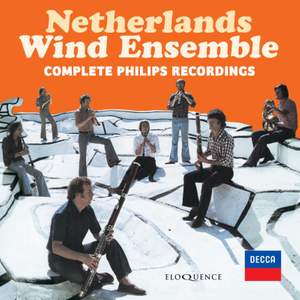Issued complete for the first time, including several albums new to CD, is the Philips catalogue of the Netherlands Wind Ensemble an ensemble that made a defining contribution to Dutch musical life in the 1970s. The Netherlands Wind Ensemble began life in 1959 as a wind quintet, but soon expanded to play Classical-era serenades and divertimenti which were hardly known at the time but have since been recognised and enjoyed as masterpieces of entertainment music, notably the Gran Partita of Mozart, the late Octet by Beethoven and the wonderful Octet-Partitas by his Viennese contemporary, Franz Krommer.
Starting to record for Philips in 1968, the Netherlands Wind Ensemble immediately won critical praise for the technical precision of its playing as well as the brilliance and wit of its interpretations, whether led by its regular conductor Edo de Waart (himself a former oboist and member of the ensemble) or played as true chamber music. The ensemble made one of the first comprehensive recordings of Mozarts wind music, including miniatures, no less delightful for their brevity and rarity, and a precious but little-known collaboration with the much-loved Dutch soprano Elly Ameling.
The youthful, funky vibe of the Netherlands Wind Ensemble was captured by Philips both in exceptionally vivid recordings as well as kooky cover designs, which are reproduced on the sleeves of the issues. A booklet essay by Peter Quantrill outlines the history and character of the ensemble, drawing on a new interview with Edo de Waart. The repertoire extends into the nineteenth century with a classic account of the Wind Serenade by Dvorak the ensembles debut on disc as well as ingenious arrangements of overtures and arias by Rossini, and a unique collection of little marches by great masters. The Netherland Wind Ensembles long-standing commitment to modern music is represented by the wind music of Richard Strauss and Stravinsky, and the pioneering Jazz Symphony by the Franco-American bad boy of classical music in the 1920s and 30s, Georges Antheil, recorded live at the 1976 Holland Festival.
Review Quotes
I cannot imagine a more refreshing sound than that of the Dvorak D minor Serenade which Edo de Waart and the Netherlands Wind Ensemble This playing blends discipline and spontaneity in just the right proportions This record has deserved all the praise it has received both on artistic and technical grounds. Gramophone, August 1971
Assured, precise and shapely performances. Gramophone, February 1973 (Little Marches by Great Masters)
De Leeuw and ensemble show a good grasp of the 20s jazz idiom, and the live performance is a winner. Fanfare, March 1978 (Antheil: Jazz Symphony)
Few modern authentic Rossini performances have so caught the fun of the music, its energy and charm, and to this is added the sheer pleasure of an impeccably tuned wind band, irreproachably together. High Fidelity, August 1978 (Rossini)
This is a very good recording, mellow (not backward) in sound, and played with serenity or sparkle as the particular passage demands. Gramophone, June 1985 (Mozart arrangements)
Their performances are fresh and alive, admirably sensitive both in feeling for line and in phrasing, but never lingering too lovingly over detail. Penguin Guide, 1990 (Mozart KV 375, KV 388)



